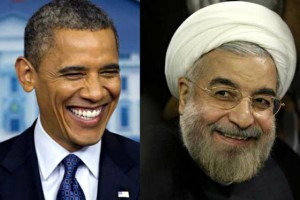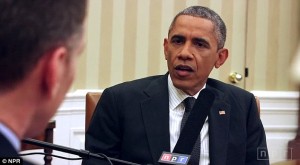Editor’s Note – In an interview with NPR, one delayed for over 11 days, Obama reveals his true intent once again toward despots, strongmen, and tyrants. Obama shocked the world many times with his appeasement mentality, but just recently Cuba was perhaps the biggest – now Iran?
He talks about Iran with ‘ifs’ and ‘buts’ but he also extols their virtues. He raises several in his opinion by saying:
‘…there’s incredible talent and resources and sophistication inside of Iran, and it would be a very successful regional power that was also abiding by international norms and international rules, and that would be good for everybody.’ (Emphasis added)
Of course he hinges everything on how Iran acts toward international norms on nuclear energy use, but that in and of itself is incredibly naive or is part of his grander scheme – let Iran become a nuclear power.
His legacy would certainly be etched deeply if he were to unilaterally open an embassy again in Tehran just like he intends for Cuba, but we have news for him – that is not in the ‘best interests’ of America as he quotes himself.
It’s not a good legacy and it insults all previous actions taken by our bravest in the past over the entire region. What about our allies in the region?
‘And what I said then remains true: If I thought it advances American interests, yes. I believe in diplomacy, I believe in dialogue, I believe in engagement.’
Does Obama ever listen to the actual words spoken by the Mullahs in Tehran? “Successful regional power?” What does that mean? Apparently he thinks they will play nice with their neighbors in the Sunni world and/or Israel, really? Iran does not intend on being a regional power; it never has – it’s goal is far greater and Israel would cease to exist in that scenario.
He also believes that he has isolated Iran more than ever – really? Iran is openly working with Iraq against IS and is certainly in the good graces of Russia, China, and the Assad Regime in Syria – isolation? Talking to liars and expecting positive results is surely the work of the naive – a naivete nurtured for over six years.
Then there is the matter of calling Tehran a country, not Iran’s capital city. Read on and judge for yourself, and then ask why the interview was delayed:
Olive branch to the mullahs:
Obama won’t rule out embassy in TEHRAN but says the Iranian capital is a country – not a city
- Interview was conducted in the Oval Office the day after Obama said he would normalize relations with Cuba – but held back for 11 days
- Embassy in Tehran would be the first since 1979 hostage crisis, which Iranians still celebrate as the ‘Conquest of the American Spy Den’
- Obama said if Iran proves it’s not seeking nuclear weapons, it would become a ‘very successful regional power’
- Claimed credit for isolating Tehran through economic sanctions
By David Martosko, Us Political Editor For Dailymail.com – Daily Mail
President Barack Obama said Monday that Iran might join Cuba as a second rogue state to enjoy normalized diplomatic relations with the United States under his administration.
In a 40-minute interview with National Public Radio conducted on December 18 – but held back for 11 days – the radio network’s senior morning host quizzed Obama in the Oval Office about a wide range of policy positions, including his plans for the Middle East.
‘Is there any scenario under which you can envision, in your final two years, opening a U.S. embassy in Tehran?’ asked NPR’s Steve Inskeep. ‘I never say never,’ Obama replied, while allowing that ‘I think these things have to go in steps.’
The unprecedented olive branch pointed in the direction of Iran’s mullahs will stoke controversy among older Americans who recall the 1979 hostage crisis in the last embassy Washington maintained there. Fifty-two Americans, mostly diplomatic personnel, were taken hostage in November of that year and held for 444 days but a group of student revolutionaries.
In Iran the event is still celebrated as the ‘Conquest of the American Spy Den.’ Few observers believe Iran is interested in proving its stated intentions to abandon its nuclear-weapons ambitions by the time Obama leaves office in January 2017.
But the president believes there’s a chance. ‘We have to get this nuclear issue resolved – and there’s a chance to do it,’ he said, ‘and the question’s going to be whether or not Iran is willing to seize it.’
If the country’s anti-America hardliners yield to more moderate voices, he predicted, ‘there’s incredible talent and resources and sophistication inside of Iran, and it would be a very successful regional power that was also abiding by international norms and international rules, and that would be good for everybody.’
‘That would be good for the United States, that would be good for the region, and most of all, it would be good for the Iranian people.’ Obama shocked the world – and angered America’s Cuban emigres – with a December 17 announcement that he would re-establish formal ties with the Raul Castro regime in Havana.
But speaking to NPR eleven days ago, he painted Iran differently – noting that a more recent history of aggression makes U.S.-Iran relations ‘different from the history between us and Cuba.’ ‘And the strategic importance of Tehran is – or Iran – is different from what we face with Cuba.’
The Islamic republic, he reminded Inskeep, ‘has a track record of state-sponsored terrorism, that we know was attempting to develop a nuclear weapon.’ But in the same breath Obama said ‘Tehran is a large, sophisticated country.’
Tehran is Iran’s capital city.
%CODE%
That lapse aside, Obama emphasized Monday a theme that he has grappled with since the heady days of his first presidential campaign: the prospect of changing the global diplomatic map by bringing unfriendly nations under America’s wing.
‘I was asked very early in my presidential race back in 2007 – would I meet with these various rogue regimes?’ he recalled.
‘And what I said then remains true: If I thought it advances American interests, yes. I believe in diplomacy, I believe in dialogue, I believe in engagement.’ He also claimed credit for what he characterized as a realignment of global attitudes toward Iran:
‘When I came into office, the world was divided and Iran was in the driver’s seat,’ Obama said. But through economic sanctions, ‘now the world’s united because of the actions we’ve taken, and Iran’s the one that’s isolated.’
‘I mean, there’s a reason why we’ve been able to get this far in the negotiations,’ he said: ‘We mobilized the international community at the start of my presidency – a classic example of American leadership.’
But Iran’s supreme religious authorities, who run the country despite the fig leaf of a constitutional government, has ‘a path to break through that isolation,’ Obama declared. ‘And they should seize it.’
Obama drew criticism in 2008 for subtly changing his positiion on negotiating with antagonistic countries. Speaking to an audience of Jewish advocates in June of that year, he insisted that he had ‘no interest in sitting down with our adversaries just for the sake of talking.’
‘But as president of the United States, I would be willing to lead tough and principled diplomacy with the appropriate Iranian leaders at a time and place of my choosing if and only if it can advance the interest of the United States.’
But during a debate eight months earlier he was asked whether he would be willing to meet Iran’s leaders ‘without precondition,’ during the first year of his administration.
‘I would,’ then-Senator Obama replied. ‘And the reason is this: the notion that somehow not talking to countries is punishment to them – which has been the guiding diplomatic principle of this [George W. Bush] administration – is ridiculous.’



